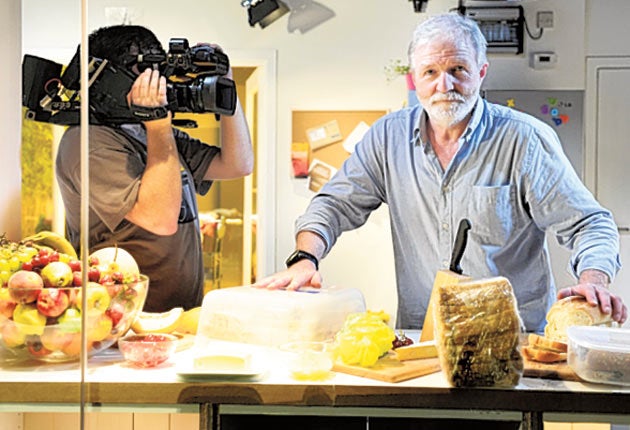Breaking the mould: A new TV series is offering viewers the chance to see food rot
Alice-Azania Jarvis meets the experts who are dedicated to decoding decay

Your support helps us to tell the story
From reproductive rights to climate change to Big Tech, The Independent is on the ground when the story is developing. Whether it's investigating the financials of Elon Musk's pro-Trump PAC or producing our latest documentary, 'The A Word', which shines a light on the American women fighting for reproductive rights, we know how important it is to parse out the facts from the messaging.
At such a critical moment in US history, we need reporters on the ground. Your donation allows us to keep sending journalists to speak to both sides of the story.
The Independent is trusted by Americans across the entire political spectrum. And unlike many other quality news outlets, we choose not to lock Americans out of our reporting and analysis with paywalls. We believe quality journalism should be available to everyone, paid for by those who can afford it.
Your support makes all the difference.There are dozens of programmes about lions and tigers and living things," observes Fred Hepburn. "But there's not very much that shows the other side of natural history. It's so important to life, and we tend to take it for granted."
Hepburn is the producer of After Life: The Science of Decay, a forthcoming documentary on BBC Four that promises to "explore the grotesque nature of decomposition". To be aired in December, it will recount the ongoing experiment that Hepburn and his team – including the renowned zoologist and television presenter George McGavin – have been conducting inside a giant glass box at Edinburgh Zoo. For six weeks, the box has been set up with a fully equipped kitchen and "garden". The scene has been set for a family barbecue – chicken left out, burgers ready to go on the grill. The only difference is that the family are mysteriously absent, the contents of their barbecue left untouched. The idea, Hepburn explains, has been to simulate "the normal conditions of a house during summer". Temperature and ventilation are being carefully controlled, and a typical quantity of flies, beetles and insect larvae were left in the garden. The effect is that of some post-human world: eerie and stinking of decay.
Throughout the process, 12 time-lapse cameras are being trained on the "rot box". When the experiment is completed at the end of September, the footage will be compiled into a 90-minute-long film. In the meantime, those curious as to the box's progress can visit it in person. "The response from the public has been amazing," Hepburn says of this. "They've really embraced the concept. Parents bring their children to educate them both about the cycle of life and about what happens if they don't tidy up after themselves."
Visitors aren't actually allowed into the box – instead they're asked to view it from the outside. Access to the interior is closely monitored, thanks to the need to maintain authentic conditions. But for those who are allowed in – Hepburn and McGavin among them – the "gross" factor is pretty high. "The vegetables are OK but the smell of the rotting meat really is very bad indeed," McGavin says. "It clings to your clothes – I got in a taxi once after being inside the box and the driver asked where I'd been. He chucked a can of deodorant on me!"
Soon, visitors to the interior will have to wear beekeepers' masks, so dense will the swarms of flies have become. On the upside, as time progresses the stench should actually moderate – already, Hepburn says, it's not as bad as it was. "When you go inside, it's like looking at an alien version of the world. You can still identify some things – not the sandwiches, which are unrecognisable, but other items. They look very strange. The chicken has sort of flattened out, the peppers look like they've been burnt, and the pineapple stalk is surrounded by mush."
On 12 September, McGavin will take part in a live webcast for schools. It's just one part of the programme's interactive ethos. Since the box was set up, updates have been tweeted to the world from a dedicated Twitter account, @bbcrotbox (sample tweet: "Monday morning. More flies. More pupae. Larder beetles chomping on dried flesh."), and photos of the scene's gradual disintegration can be seen online. Oddly, not all of it is as repulsive as it might sound. Says Hepburn: "It's fascinating. We think of mould as ugly, but you look at it with the latest optical microscope and it's really quite beautiful."
'After Life: The Science of Decay' will air in December on BBC Four
Join our commenting forum
Join thought-provoking conversations, follow other Independent readers and see their replies
Comments